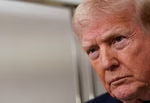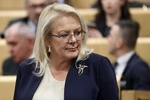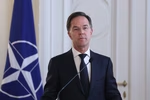Sacirbey on Trump, nationalism, and Bosnia’s path forward in US-led alliances

Former Bosnian Foreign Minister Muhamed Sacirbey has compared Donald Trump to Slobodan Milosevic, arguing that both leveraged nationalism to win power without being true ideologues. In an interview with N1, Sacirbey expressed concern over the influence of Trump’s nationalist backers and warned that Bosnia must align with Western democracies to secure its future amidst rising global polarization.
"Neither Trump nor Milosevic are ideological nationalists," Sacirbey stated, "but both rode waves of nationalism to power." He noted that, in private, both men display a surprising level of politeness despite their divisive public personas. Reflecting on the atmosphere in the US following Trump’s rise, Sacirbey added that the transition has been marked by unease, as Trump’s selection of high-level officials included several controversial and relatively inexperienced individuals.
When asked if the US has entered an era where financial interests override all else, Sacirbey agreed, explaining that Trump’s campaign had limited ideological roots and relied heavily on nationalist sentiments. "Trump won by using nationalism, even though he doesn’t deeply hold those beliefs," Sacirbey elaborated. He cautioned that such a dynamic places an undue influence on Trump’s wealthy backers, who may now be expecting certain returns on their support.
Sacirbey expressed doubt that Trump would follow through on his promises, particularly those directed at the more vulnerable segments of American society, calling this a familiar issue in democratic politics where promises are often left unfulfilled.
Sacirbey drew a striking parallel to his own experience negotiating for peace in Bosnia, recalling how Milosevic would privately concede that he wasn’t genuinely committed to nationalist ideology but felt compelled to follow nationalist pressures.
"It’s the same type of people around Trump now," Sacirbey observed, expressing concerns over their potential impact on Trump’s decision-making. Discussing Trump’s stance on immigration, he pointed out the inconsistency between nationalist ideals and economic realities. "The U.S. needs foreign workers, even undocumented ones, yet Trump’s rhetoric against migrants and plans to expel them creates a conflict between ideology and necessity," he argued.
Importance of Bosnia’s strategic choices
Turning to Bosnia and Herzegovina’s future in the new global landscape shaped by Trump’s presidency, Sacirbey addressed potential consequences for the country. He advocated for a constructive approach, resisting the urge to focus solely on the negatives.
"The polarization we see worldwide is troubling, but Bosnia must make strategic choices about who its allies are," he said. For Sacirbey, aligning with Western democracies offers Bosnia a more secure and stable future compared to falling under autocratic influence from the East. He acknowledged that during his tenure, Bosnia and Herzegovina’s role in Washington and Brussels held more significance, and he urged current leaders to assert themselves in the corridors of American and European power. "Our leaders need to make Bosnia visible to the most influential figures in US and European administrations, to push our interests effectively," he stated, emphasizing the need for strategic diplomacy.
In response to Bosnia’s ongoing lobby efforts in the US, Sacirbey acknowledged the challenges posed by Republika Srpska entity’s significant investment in lobbying for its own interests, sometimes in opposition to the Federation entity’s or the State’s. He argued that Bosnia must present a stable, united stance on the international stage to counterbalance these efforts. Sacirbey underscored the critical importance of Bosnia’s institutional alignment with NATO and the EU, stressing that NATO, in particular, could facilitate Bosnia’s EU accession by securing US support.
"NATO was always more significant for me because it represents a gateway for America to push Bosnia toward EU membership," he said. Sacirbey noted that numerous European countries first joined NATO under US support before eventually entering the EU, making NATO alignment a strategic priority for Bosnia.
Sacirbey strongly criticized calls for a “Dayton 2” or “Dayton 3” as unrealistic, labelling such proposals as "false promises." According to him, the original Dayton framework already established Bosnia’s path toward full integration, including necessary safeguards for both security and institutional development. "When someone talks about Dayton revisions, they’re ignoring the fact that full integration of Bosnia is already part of the original plan," he insisted, adding that stability within this framework could enhance foreign investments and secure institutional progress.
Lobbying and Bosnia’s allies in US
Asked if any Bosnian officials had approached him to seek connections within Trump’s circle, Sacirbey said that no requests had been made. However, he highlighted that Bosnia’s Ambassador to the US, Sven Alkalaj, maintains some ties within Washington and had even accompanied Sacirbey to a recent film screening in Congress, attended by several Republicans. Sacirbey hinted that while such connections exist, their effectiveness would depend on Alkalaj’s approach and backing. He also mentioned that Bosnian leader Zeljko Komsic had visited Washington, expressing hope that Komsic’s trip included discussions with Congressional members to strengthen Bosnia’s profile within US policy circles.
Sacirbey identified US Senator Marco Rubio as a potential ally for Bosnia, noting Rubio’s consistent support for democratic institutions and vocal opposition to authoritarian practices, especially regarding human rights issues in countries like China.
"Rubio’s focus on defending minority rights in authoritarian states could align well with Bosnia’s historical stance as a multiethnic and democratic country," he argued, emphasizing the importance of Bosnia aligning itself with Western democratic values. Although Bosnia has enjoyed warm relations with the Islamic world, Sacirbey insisted that Bosnia’s future lies within the framework of Western alliances. Discussing Turkey’s shifting role, he cautioned against relying too heavily on Turkish support, pointing out that Turkey’s foreign policy ambitions may not always align with Bosnia’s interests.
Kakvo je tvoje mišljenje o ovome?
Učestvuj u diskusiji ili pročitaj komentare





 Srbija
Srbija
 Hrvatska
Hrvatska
 Slovenija
Slovenija



























































